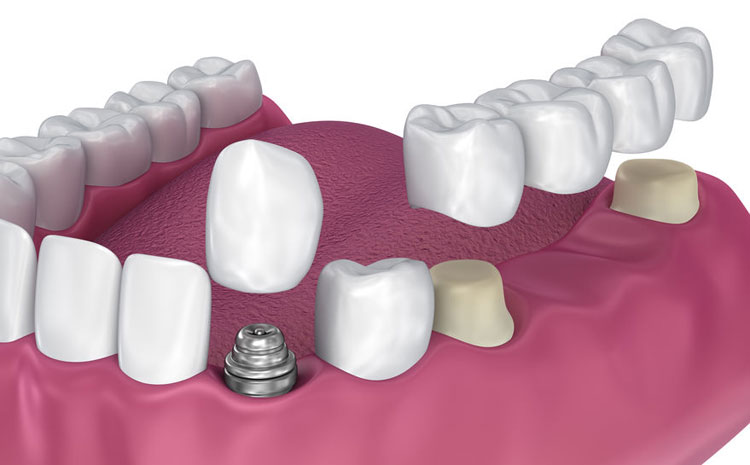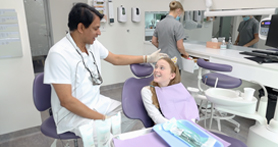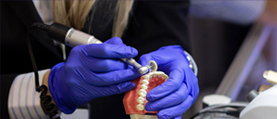Dental implants are replacement for real tooth root. They are artificial, but considering all the replacement tooth used today, dental implants are the nearest alternative to the natural tooth root to support an artificial tooth. They are almost like the natural tooth root and allow you to carry out all the activities that you can do with natural teeth.
What does dental implant surgery involve?
Dental implant surgery procedure involves inserting a metal screwlike post in the jawbone in place of the original roots and leave it there for a few months, so that the bone tissues surround the screw totally and make it immovable on its own. When enough bone tissue grows around the metal screw to hold it still, an abutment is placed on top of the screw which in turn holds the artificial tooth placed on it tightly. This arrangement is strong and usually keeps the tooth working for a long period of time. The screws are made of titanium which fuses with the jawbone tissues and do not corrode or harm in any way.
Who can opt for dental implants?
Dental implants are installed for missing and lost teeth. When you have one or more missing teeth then you can consider going for dental implant surgery, if you fulfil other conditions necessary for getting implants for your teeth.
1. Good General health
Dental implant installation is a surgery, and you need to have a healthy physique, without any serious health conditions. You need to have good growth of bone tissue around implant to complete the installation of crown over the implant. If the growth of bone tissue takes long than it will be a long process.
2. Medications for other ailments
Certain physical conditions and the medicines impede bone healing. Implants need to have growing bone tissue around it for it to set in the bone and take the weight of the crown above it. Some medications do not allow healing and growth of new tissues, in which case dental implants cannot succeed.
3. Mature jawbone
You must be over 18 years and must have fully grown jawbone. If your jawbone is still growing, than it is difficult to support an implant.
4. Healthy bone
You have to have the required amount of bone left on the jaw because after you lose a tooth, the jawbone retreats and after a certain period you will have a considerable amount of bone loss. If bone resorption has occurred, then dental implants cannot work.
5. Healthy oral tissues
For the bone tissue to grow around the metal screw in the jawbone, the tissue should be clean without any ailment. There should not be any bacteria, or malignancy in the tissue.
6. Use of tobacco
You should not use tobacco. Smoking can obstruct the growth of bone tissue and tobacco otherwise is not good for health.
7. Commitment to success
You should be ready to go through the procedure for a few months, and more if it takes long to regrow the bone tissues. Sometimes more months can be required, and you should ben able to wait if you must go that extra mile.
Risks of Dental Implant Surgery
Dental implant surgery does have some risks like any other surgery. Problems do not occur often, but sometimes there can be certain impediments in healing and therefore, it is advisable to see that you do not have conditions that can pose a problem.
1. Sinus cavities.
Our face and mouth have cavities called sinus to protect us from certain conditions which are harmful to us. One of the sinus lies just above the upper jaw. When you have cold, these cavies get filled with fluid and may exert pressure on the jaws. When the implants are being installed the surgeon has to be very careful not to pierce the sinus.
2. Injuries or damage to surrounding structures
The neighbouring teeth and adjoining dental structures may get damaged due to implant surgery. The dentist will have to check for any pain or bleeding due to injury. He has to stop the pain and bleeding before he can resume the surgery.
3. infection at the implant site
The site of the missing tooth must be cleaned before the surgery, but sometimes there is reinfection at the site which is harmful for the dental implant. If there are infection and bacteria, the bone tissue cannot grow around the implant and the screw will not be able to stand firm which in turn cannot support the crown. The dentist will have to clean the area again and wait before resuming the surgery.
4. Nerve damage which can pain tingling and numbness in lips
The nerves which are surrounding the dental structures may get damaged while doing implant insertion. In such a case, there can be numbness in the lips, cheeks and tongue. The can be tingling sensation in the mouth and cheeks. The dentist has to take care of these issues before any work gets done.
Before the dental implant surgery
- Complete examination of the teeth and mouth.
The dentist will get x rays and images taken and will get the models done of your entire set of teeth and gums.
- Evaluation of your medical history
The dentist will ask you question and will want to consult your family physician before the decision is taken for the surgery. He will want to know your list of medicine that is prescribed, and your habit of taking over the counter medicine. Tell your dentist about any illnesses in the family, the drugs or supplements that you may be taking and also about any orthopaedic implements in your body. Talk about smoking or drinking habit you may have.
- Anaesthesia
Discuss the type of anaesthesia you would prefer with your dentist before the surgery takes place. Your dental team will consult you about sedation also. Discuss what you prefer.




